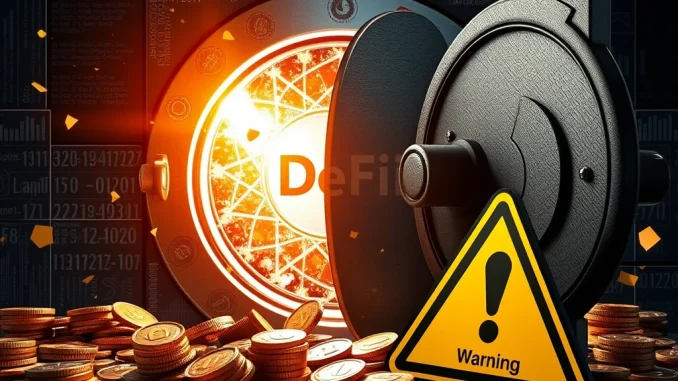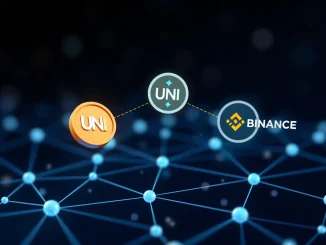
Hold onto your hats, crypto enthusiasts! The decentralized exchange (DEX) world has just been hit with another curveball. KiloEx, a perpetual DEX platform, has announced a temporary platform suspension following a concerning Vault exploit. If you’re invested in DeFi or closely watching the crypto space, this news is definitely something to pay attention to. Let’s dive into what we know about this developing situation.
What Happened to KiloEx’s Vault? Unpacking the Crypto Exploit
In a terse announcement on X (formerly Twitter), KiloEx revealed that its Vault, a crucial component of its decentralized exchange infrastructure, had been compromised. While details are still emerging, the core message is clear: a crypto exploit has occurred. This isn’t just a minor glitch; it’s a serious security incident that has prompted the platform to take immediate action. Here’s a breakdown of what we know so far:
- Vault Compromise: KiloEx confirmed that their Vault was the target of the exploit. Vaults in DeFi often hold significant amounts of user funds, making them prime targets for malicious actors.
- Platform Suspension: To contain the situation and prevent further damage, KiloEx has proactively suspended all platform activities. This means trading, deposits, and withdrawals are likely temporarily unavailable.
- Working with Experts: The KiloEx team stated they are collaborating with security experts. This is a standard and crucial step in such incidents, as external experts can provide objective analysis and guidance on remediation.
- Asset Tracking: A key focus is on tracking the movement of the stolen assets. Blockchain’s transparent nature, while not foolproof, allows for tracing transactions, which is vital in recovery efforts.
- Bounty Initiative: KiloEx intends to launch a bounty initiative. This is a common tactic to incentivize ethical hackers or security researchers to help recover the stolen funds or provide information leading to the perpetrators.
- Estimated Losses: Cyvers Alerts, a blockchain security firm, reported early estimates of losses around $7 million. While this figure might fluctuate as investigations continue, it highlights the significant scale of the Vault exploit.
[img]Imagine a digital vault with its doors forced open, symbolizing the KiloEx exploit.[/img]
Immediate Response: Platform Suspension and Asset Tracking After the Vault Exploit
The immediate aftermath of a crypto exploit is always critical. KiloEx’s decision to enact a platform suspension demonstrates a commitment to prioritizing user safety and preventing further losses. But what does this suspension practically mean, and what other steps are they taking?
| Action | Description | Purpose |
|---|---|---|
| Platform Suspension | Temporary halt of all platform activities (trading, deposits, withdrawals). | Contain the exploit, prevent further unauthorized access and potential loss of funds, allow for investigation and security updates. |
| Security Expert Collaboration | Engaging external cybersecurity firms and professionals. | Benefit from specialized expertise in incident response, forensic analysis, and security best practices. |
| Asset Tracking | Monitoring blockchain transactions to trace the movement of stolen funds. | Potentially recover assets, identify perpetrators, and provide evidence for law enforcement if necessary. |
| Bounty Initiative | Offering rewards for information leading to asset recovery or perpetrator identification. | Crowdsource intelligence and leverage the wider security community’s help in resolving the situation. |
These actions are not just about damage control; they are about rebuilding trust. In the volatile world of DeFi, trust is paramount. How KiloEx handles this Vault exploit and the subsequent recovery will significantly impact its future and user confidence.
Why DeFi Security is Paramount: Lessons from the KiloEx Incident
The KiloEx crypto exploit serves as a stark reminder of the critical importance of DeFi security. While decentralization and permissionless access are core tenets of DeFi, they also introduce unique security challenges. What makes DeFi platforms vulnerable, and what can be learned from incidents like this?
- Smart Contract Vulnerabilities: DeFi platforms rely heavily on smart contracts. Bugs or flaws in these contracts can be exploited by attackers. Rigorous audits and testing are essential, but even then, vulnerabilities can sometimes slip through.
- Complexity and Interoperability: DeFi protocols are often complex and interconnected. This interconnectedness can create cascading risks, where a vulnerability in one protocol can impact others.
- Open Source Nature: While transparency is a benefit, the open-source nature of many DeFi projects also means that code is publicly available for scrutiny – by both developers and potential attackers.
- Relatively New Technology: DeFi is still a relatively nascent field. Best practices and robust security standards are still evolving. The rapid pace of innovation can sometimes outstrip security considerations.
- Custodial Risks (Even in DEXs): While DEXs aim to be non-custodial, certain aspects, like Vaults or smart contracts managing pooled funds, inherently involve custody and therefore risk.
For users, this incident underscores the need for caution and due diligence when engaging with DeFi platforms. For developers and platform operators, it’s a call to prioritize security at every stage of development and operation.
Lessons Learned from the KiloEx Exploit: Actionable Insights for Users and Platforms
Every crypto hack, while unfortunate, provides valuable lessons. The KiloEx Vault exploit is no exception. What actionable insights can users and DeFi platforms take away from this incident to bolster security and mitigate risks?
For DeFi Users:
- Diversification is Key: Don’t put all your eggs in one basket. Spread your assets across multiple platforms and protocols to reduce risk.
- Due Diligence on Platforms: Research the security practices of platforms you use. Look for audits, security certifications, and track records.
- Understand the Risks: Be aware of the inherent risks of DeFi, including smart contract risks, impermanent loss, and platform-specific vulnerabilities.
- Stay Informed: Keep up-to-date with security news and best practices in the DeFi space. Follow security experts and reputable news sources.
- Use Hardware Wallets: For larger holdings, consider using hardware wallets for enhanced security of your private keys.
For DeFi Platforms:
- Rigorous Security Audits: Conduct regular and thorough security audits by reputable firms.
- Bug Bounty Programs: Implement robust bug bounty programs to incentivize ethical hackers to find and report vulnerabilities.
- Multi-Sig and Governance Controls: Employ multi-signature wallets and robust governance mechanisms for critical functions to prevent single points of failure.
- Incident Response Plans: Have well-defined incident response plans in place to quickly and effectively address security breaches.
- Transparency and Communication: Maintain transparent communication with users about security measures and incidents. Build trust through openness.
Looking Ahead: KiloEx’s Recovery and the Future of Decentralized Exchanges
The road to recovery after a platform suspension and Vault exploit is rarely easy, but it’s not insurmountable. The resilience of the crypto space has been demonstrated time and again. What might the future hold for KiloEx, and what does this mean for the broader landscape of decentralized exchanges?
KiloEx’s immediate focus will undoubtedly be on:
- Security Remediation: Fixing the vulnerability that led to the exploit and enhancing overall platform security.
- Asset Recovery Efforts: Continuing to track stolen assets and working with law enforcement or security firms to attempt recovery.
- User Communication and Support: Keeping users informed about the recovery process and providing support.
- Platform Re-launch: Planning for a secure and confident re-launch of the platform, likely with enhanced security measures in place.
For the future of DEXs, this incident reinforces the ongoing need for innovation in security practices. As DeFi matures, expect to see:
- Advanced Security Technologies: Greater adoption of formal verification, AI-powered security monitoring, and other advanced security technologies.
- Insurance and Risk Mitigation: Growth in DeFi insurance solutions to protect users against exploits and hacks.
- Community-Driven Security: Increased emphasis on community audits, bug bounties, and collaborative security efforts.
- Regulatory Scrutiny: Potentially increased regulatory attention on DeFi security practices to protect users and the broader financial system.
In conclusion, the KiloEx crypto exploit is a stark reminder of the ever-present security challenges in the DeFi space. While concerning, it also presents an opportunity for learning, growth, and the continued evolution of more secure and resilient decentralized financial systems. The industry’s response, including KiloEx’s recovery efforts, will be crucial in shaping the future of DeFi and user trust in these innovative platforms.



